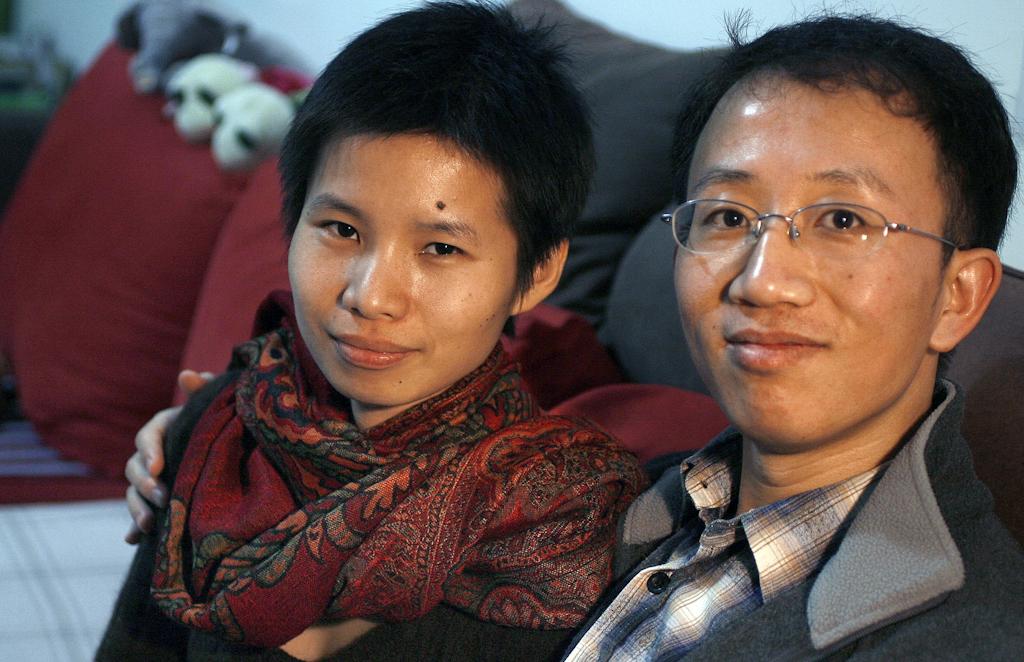Chinese dissident Hu Jia released from prison
This file photo taken on January 9, 2007 shows Chinese human rights activists Hu Jia (R) and his wife Zeng Jinyan (L) in their apartment on the outskirts of Beijing. Zeng, the wife of jailed Chinese rights activist Hu Jia, who is due to be freed this weekend, has said on June 21, 2011 she is back in her Beijing home after being apprehended and taken to visit her husband in prison. Zeng said on her Twitter account that she was taken away by eight unidentified people after landing at Beijing airport on June 19, 2011, but then was allowed to meet with Hu at the prison on June 20, 2011. Hu is due to be released on June 26, 2011 after serving three and a half years for subversion.
China has freed prominent dissident Hu Jia, imprisoned for three and a half years on subversion charges that stemmed from his criticism of the Chinese government in blog posts and interviews.
Hu’s release coincidentally follows that of activist and artist Ai Weiwei, who was freed on bail June 22 after being arrested and held at a secret detention center for 80 days.
Chinese Premier Wen Jiabao is currently visiting Europe with stops in Hungary, Britain and Germany. China released Hu around the same time that Wen was arriving in Birmingham, in central Britain, on a trip aimed at strengthening economic and political ties between London and Beijing.
(More from GlobalPost in China: Ai Weiwei speaks)
"On a sleepless night, Hu Jia arrived home at 2:30 am. Peaceful, very happy. Need to rest for awhile. Thanks to you all," his wife Zeng Jinyan wrote on her Twitter account, @zengjinyan.
Zeng, who is also a political activist, said that her husband was not yet ready to speak to the media.
"At the moment, I want everything to be peaceful. I'm worried that doing interviews at this stage might cause problems. Please understand,” she told Reuters.
Ai Weiwei is under continuing government restrictions regarding use of social media such as Twitter, and speaking to journalists. He cannot leave Beijing without permission and has reportedly been banned from using Twitter for a year.
Hu Jia, 37, was arrested in December 2007 following a long period of detention at his home, and sentenced by a Beijing court in April 2008 to three and a half years in prison for "incitement to subvert state power," a charge commonly use against dissidents.
He had criticized China's human rights records on his blog and in interviews with foreign journalists, and was one of many dissidents arrested in the run-up to the 2008 Beijing Olympic Games.
Hu, a Buddhist, was also an advocate for rural AIDS patients and an environmental protection campaigner, and had criticized China’s grip on religion in Tibet.
In October 2008, he won the European parliament’s top human rights award, the Sakharov Prize for Freedom of Thought. But because he was in prison, he was represented by an empty seat.
More than 130 people have been detained in China since February, amid Communist Party fears of a “Jasmine Revolution” following the anti-government uprisings in the Middle East and North Africa.
On Sunday morning, there was heavy police presence around Hu and Zeng’s home in east Beijing, Reuters reports. The apartment complex where they live is called Bobo Freedom City, and Hu previously made a short video called “Prisoner of Freedom City” to document harassment by security agents while he was under house arrest prior to being sent to prison.
The group Human Rights Watch says it is concerned that the Chinese authorities might again put Hu Jia, his wife and their 3-year-old daughter under house arrest.
"Hu Jia should never have been imprisoned in the first place," Sophie Richardson, Asia advocacy director at Human Rights Watch, said in a statement. "If that injustice is compounded by another form of detention it will show just how shallow the Chinese government's ‘rule of law' commitments are."
Chen Guangcheng, a blind lawyer who exposed forced sterilizations and abortions in the Chinese city of Linyi, has been held under house arrest with his wife and young daughter since his release in September 2010.
"I have come out of a small jail and walked into a bigger jail,” he said in a homemade video that was smuggled out of his house earlier this year.
Since the video came out, Chen has reportedly been beaten and the harassment of his family has increased.
